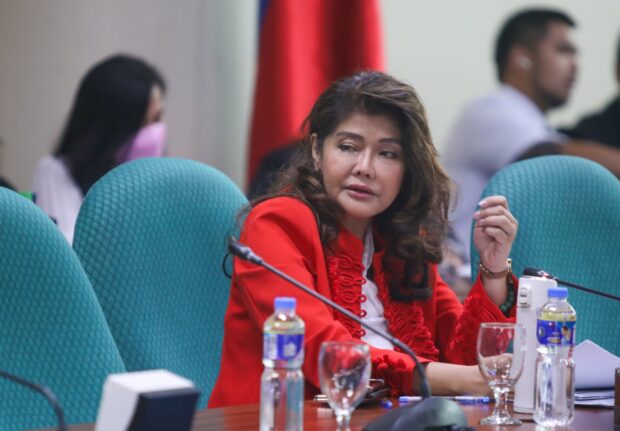Sen. Marcos hits extended tariff cuts on rice, corn, meat

Sen. Imee R. Marcos (Bibo Nueva España/Senate PRIB)
MANILA, Philippines — Senator Imee Marcos questioned the extension of reduced tariffs on rice, corn, and meat products and if the Philippine government can gear up against the threat of El Niño with a “failed scheme of cheap importation” to lower food prices.
In a statement on Wednesday, Sen. Marcos pointed out that in 2021, when the tariffs on meat, rice, and corn were first lowered, prices have not fallen below the “promised pre-2021 levels.”
“Today, as we anticipate the additional worldwide threat of El Niño, can we persist with that failed scheme of cheap importation to lower food prices? Firstly, relying on imports and modifying the rates are not sustainable policies because other countries are limiting their exportation of food to serve their domestic needs first,” she said.
“Further, how can [a] much-reduced government collection of import duties on rice, corn, [and] meat products subsidize the agricultural inputs so direly needed by our local farmers?,” she added.
Article continues after this advertisementSen. Marcos said the government should instead focus on fast tracking the completion of irrigation facilities, building warehouses, food storage, and an expanded cold chain.
Article continues after this advertisement“It is time to review the implementation of the repopulation program of the Department of Agriculture for areas affected by the African Swine Fever, realistically facing the challenge of biosecurity for the 67 percent of our backyard hog raisers,” she said.
“We need to see the specifics as well of the programs for our corn farmers and poultry raisers. I see line items in the new 2024 General Appropriations Act for fertilizer and fuel subsidies for corn farmers — are they really going to lower production costs and market prices?,” she added.
The senator’s brother — President Ferdinand “Bongbong” Marcos Jr. – earlier approved the extension of reduced tariffs on rice, corn, and meat.
This, in light of the looming impact of El Niño on the production of the aforementioned goods as well as the prevalence of African Swine Fever that restricts meat trade in selected countries.